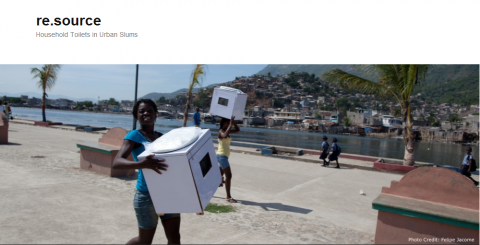Mobile sanitation services for dense urban slums - Various documents on results from research grant.
Russel, K. (2013)

Published in: 2013
Publisher:
Stanford University, USA
Author:
Russel, K.
Uploaded by:
SuSanA secretariat
Partner profile:
common upload
13558 Views
226 Downloads
Location of library entry
This library entry contains background documents for a grant that Kory Russel is leading and which is funded by the Bill and Melinda Gates Foundation.
Further information and a discussion is available on the SuSanA discussion Forum, see link below.
Short description of the project:
We aim to develop a low-cost sanitation service for the one billion (and growing) people living in urban slums. We seek to perfect the hardware and service model for this service in order to facilitate entrepreneurial franchises around the world. Our first pilot was in Shada, a community in Cap-Haitien, Haiti, in close collaboration with our friends at SOIL.
We are developing a portable, low-cost household toilet and entrepreneurial service model to deliver a safe, dignified sanitation service in urban slums. We piloted a container-based system in Shada, a slum that has no sewers and no piped water supply. Our toilet is portable, with removable containers to collect and transport wastes safely from the community. Waste is being processed at SOIL's human waste composting facilities, generating fertilizer to improve Haiti's devastated soil resources. Our strategy is to enable local entrepreneurs to recover energy, nutrients, and material from the waste in order to subsidize the cost of the sanitation system, reduce user fees, earn a livelihood, improve the environment and boost agricultural productivity.
Since our toilets are portable, users do not need to make a large up-front payment to use our service. They subscribe for a small monthly fee, and receive the toilet as part of the service. If they terminate the service or are evicted without the option of continuing service elsewhere, they can return the toilet at no penalty.
Objectives / Activities / Key Components:
1. Design a modern, portable, affordable, and stylish container-based toilet that will appeal to urban customers who otherwise aspire to a flush toilet.
2. Develop business tools to foster the growth of sanitation service businesses around the toilets.
3. Pilot both the toilet and service in a rigorous, research based trial .
4. Integrate mobile waste tracking technology into the service to monitor performance, maximize efficiency, and minimize service costs.
5. Convert all collected waste into useful and valuable end products.
6. Produce rigorous research and business assessment tools to test and improve container-based systems ensuring that they can scale while protecting and satisfying their users.
+++++++++++++
Documents available for download:
1 - Short presentation during webinar on 7 November 2013
2 - The Encyclopoodia - A compendium of toilets for the sake of inspiring great solutions to meet that need that no one wants to talk about
3 - Presentation on assessing the effectiveness of container-based sanitation (CBS) in Cap Haitien, Haiti. FSM3 Conference in Hanoi, Jan. 2015 (by Sebastien Tilmans, Kory Russel, Sasha Kramer, Leah Page, Rachel Sklar, Jenna Davis)
Bibliographic information
Russel, K. (2013). Mobile sanitation services for dense urban slums - Various documents on results from research grant.. Stanford University, USA
Filter tags
English Fundamental research and engineering Latin America & Caribbean North America Urban informal settlements (slums)















